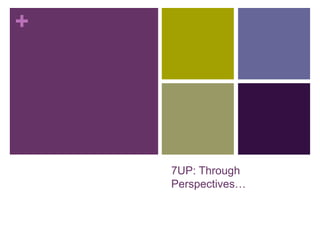
7up through the perspectives
- 2. BIOLOGICAL Remember: Focus on the physical self (brain waves, hormones, genetics) and its relationship to human behaviour. Simon Observation – Simon’s mother suffer from depression. Possible area of investigation – Is depression hereditary? If so, how likely is it that Simon will also suffer from depression? Methods – See if there are any differences between the brains of depressed people and non-depressed people. If so, compare Simon’s brain to those who are depressed.
- 3. COGNITIVE Remember: Focus on mental processes – e.g. memory, thinking, problem solving, intelligence Simon – Observation: Simon and Paul revisit the orphanage and reminisce. Possible areas of investigation: Why does Simon remember some things that Paul does not? Vice versa. Methods – Memory tests to see if they have different mental capacities.
- 4. PSYCHODYNAMIC Remember: focus is on the unconscious and not being aware of threatening desires and thoughts Simon Observation: Absent father ‘can’t miss what you don’t have’ Possible areas of investigation: Does Simon resent and have aggressive attitudes towards his father? Methods: hypnosis, dream interpretations
- 5. BEHAVIOURIST Remember: Focus is on conditioning, rewards, punishments, learning from previous experiences to regulate behaviour. Simon Observation: Lacks motivation to change jobs, low aspirations for himself, low self-esteem Possible areas of investigation: Did Simon ever receive rewards (e.g. praise) for the slightest achievements? Would it have helped him gain more self-confidence and set higher goals if he did? Possible methods: behaviour modification through conditioning, be exposed to many others with a similar background and who are successful
- 6. HUMANISTIC Remember: Focus is on human potential and self-actualisation Simon Observation: Simon had only his most basic needs met throughout his childhood. Possible areas to investigate: What other needs must be met before Simon can self-actualise? Methods: client-centred therapy – interviews to determine his needs.